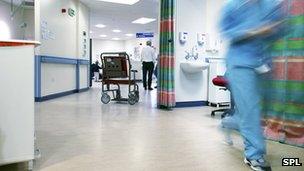Critical care bed gap 'unknown' as plans to cut bed blocking outlined
- Published

Patients with acute life-threatening illnesses and conditions receive critical care
Plans to reduce "bed blocking" and other problems preventing critically ill patients getting the NHS care they need have been outlined by ministers.
Welsh government plans to improve critical care reveal an "unknown number of patients" are denied high level care due to "capacity shortages".
The Conservatives said there was a shortage of critical care beds due to Labour's "record-breaking NHS cuts".
Around 9,000 patients receive critical care in Wales each year.
There are 3.2 critical care beds in Wales per 100,000 population, lower than the rest of the UK.
The Delivery Plan for the Critically Ill , externalsays an "unknown number of patients who should receive critical care (are) being denied access due to capacity shortages".
National critical care data shows that 111,377 critical care bed hours were lost due to patients awaiting discharge to ward beds in 2012/13 - equating to almost 13 years.
The document outlines:
Critical care units should, on average, run at an average occupancy rate of around 65-70%, to allow room for emergency admissions and spikes in demand.
All units in Wales report have occupancy rates of greater than 80%, with many often operating at over 100% occupancy at times.
Patients are sometimes cared for in operating recovery departments or extra beds are used, without the necessary increase in staff to safely manage the extra patients.
Care would be better if spread across fewer hospitals than the current 17 in order to concentrate expertise.
Organ donation
Announcing the plans, Health Minister Mark Drakeford said it was essential to ensure critical care beds were used to "maximum efficiency and effectiveness".
"Critically ill patients require close, constant attention by a team of specially-trained health professionals," he said.
"Critical care is also often the most appropriate environment for preparation for organ donation, and there is evidence that donation is sometimes difficult to accommodate with the current capacity.
"It is vital to the success of our proposed opt-out system of organ donation that we have the right plan for critical care in Wales."
Local Health Boards (LHBs) will be required to develop and publish detailed plans to identify, monitor and evaluate action needed and to report annually on progress.
LHBs have been told to "undertake a needs assessment to review current service provision and to identify where service provision needs to change to meet demand".
'Devastating impact'
Conservative health spokesman Darren Millar said: "The health minister's startling admission that Wales does not have enough critical care beds will worry many.
"Whilst I welcome his commitment to deal with this issue, I am concerned that a failure to address the bed shortage will undermine the Welsh government's aim of increasing organ donation rates through the introduction of a presumed consent donation system.
"This is yet another example of the devastating impact of the Welsh Labour government's record-breaking NHS cuts on our hospitals."
- Published1 May 2013
- Published8 April 2013
- Published3 April 2013
- Published13 March 2013